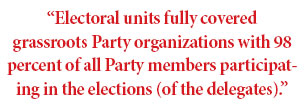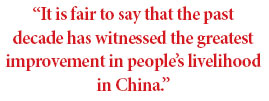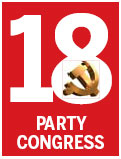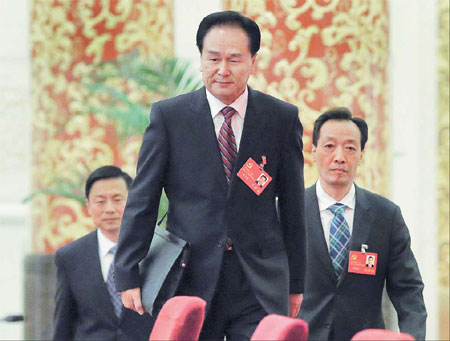Nation takes aim at corruption
Updated: 2012-11-08 07:55
By Zhu Zhe and Wang Huazhong (China Daily)
|
||||||||
|
Cai Mingzhao, spokesman for the 18th National Congress of the Communist Party of China, arrives at his first news conference for the congress in Beijing on Wednesday. Xu Jingxing / China Daily |




Party has shown its determination in battle against corruption, congress spokesman says
Tackling corruption is high on the agenda of the 18th National Congress of the Communist Party of China, a congress spokesman said on Wednesday.
Cai Mingzhao set out the importance of the anti-graft campaign, following the Bo Xilai and Liu Zhijun cases, at a news conference in response to a question from China Daily.
"The problems of Bo and Liu are serious corruption cases among leading Party cadres, and the lessons are profound," Cai said.
Dealing with both cases showed the Party's strong resolve and attitude of zero tolerance for any form of corruption, he said.
Cai said the congress will set a clear course to complete the "long, complicated and arduous task".
"We'll develop socialistic democracy, supervise officials at various levels systematically and ensure power be exercised transparently," he said.
Cai said the Central Commission for Discipline Inspection of the CPC, the Party's watchdog, is drafting a plan to tackle and eradicate corruption and detail punishment for those found guilty of graft.
Bo was former Party chief of Chongqing and a member of the Political Bureau of the CPC Central Committee. He was deprived of his Party membership on Sept 28 for severe disciplinary violations.
Bo was accused of taking advantage of his position to seek profit for others and receiving huge bribes. Investigations also showed he bore responsibility in a homicide case involving his wife.
Liu, the former railways minister, had been under investigation since February 2011 when he was removed from his government post on suspicion of "serious disciplinary violations".
He was accused of receiving massive bribes, sought huge illegal profits for business owners and bore major responsibility for severe corruption in the railway system, according to the central disciplinary authority.
Wang Xixin, a law professor at Peking University, said the spokesman openly commenting on major corruption cases involving former senior officials highlights the Party's determination to eradicate the scourge.
It shows the Party is serious and sincere and has been targeting graft over the years, Wang said.
But he said fighting corruption "at the end point" is not enough, and that's why the Party is looking to eradicate corruption from the roots by building a "comprehensive mechanism".
Zhu Lijia, a professor at the Chinese Academy of Governance, said the traditional anti-corruption measures are limited within the Party.
But the idea of establishing a mechanism to fight and prevent corruption would involve others outside the Party, he said.
"The Party has realized the urgency for building such a mechanism to address the problem systematically," Zhu said.
"It has regulated that Party officials must report assets and incomes and the next step will be disclosing the information to introduce monitoring forces, such as the people's congresses." People's congresses are China's legislative bodies.
Wang said many Party departments have become more open and transparent.
A growing number of high-profile successes by anti-corruption forces on the Internet and social media have also shown the Party supporting public enthusiasm and interacting with them to fight corruption, he said.
Political reform
Cai also said China will push forward reform of the political system, but political restructuring should be advanced according to national conditions.
"We can be sure about the advancement of political structural reform in China; people's democracy will be expanded," he said, adding that reformers "should not be intimidated by any risk or be confused by any distraction".
During the political structural reform in China, the Party has to take into consideration China's national reality and unswervingly stick to the right path made by the Party and the people amid long-term practice, he said.
Contact the writers at zhuzhe@chinadaily.com.cn and wanghuazhong@chinadaily.com.cn
(China Daily 11/08/2012 page1)

 Relief reaches isolated village
Relief reaches isolated village
 Rainfall poses new threats to quake-hit region
Rainfall poses new threats to quake-hit region
 Funerals begin for Boston bombing victims
Funerals begin for Boston bombing victims
 Quake takeaway from China's Air Force
Quake takeaway from China's Air Force
 Obama celebrates young inventors at science fair
Obama celebrates young inventors at science fair
 Earth Day marked around the world
Earth Day marked around the world
 Volunteer team helping students find sense of normalcy
Volunteer team helping students find sense of normalcy
 Ethnic groups quick to join rescue efforts
Ethnic groups quick to join rescue efforts
Most Viewed
Editor's Picks

|

|

|

|

|

|
Today's Top News
Health new priority for quake zone
Xi meets US top military officer
Japan's boats driven out of Diaoyu
China mulls online shopping legislation
Bird flu death toll rises to 22
Putin appoints new ambassador to China
Japanese ships blocked from Diaoyu Islands
Inspired by Guan, more Chinese pick up golf
US Weekly

|

|







